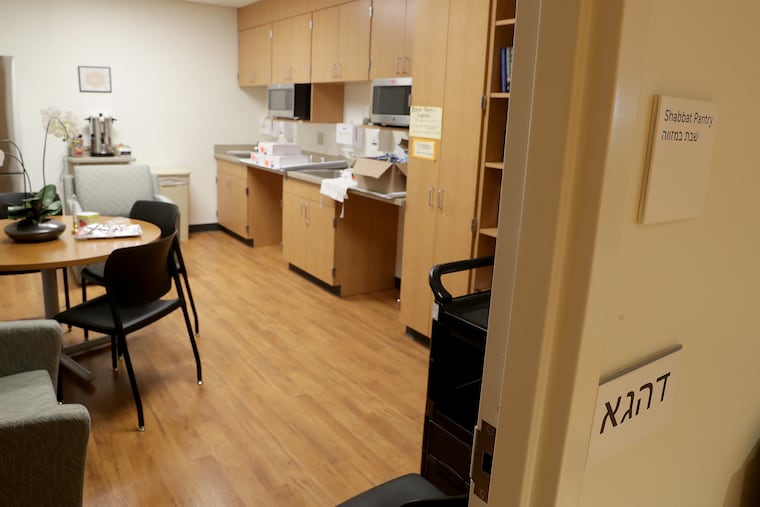Through sickness, hospital kosher pantries help Jewish families keep traditions
Area hospitals including the Children’s Hospital of Philadelphia, the Hospital of the University of Pennsylvania, Lankenau Hospital and Thomas Jefferson University Hospital have opened Shabbat pantries that provide places for observant Jews to maintain tradition while visiting loved ones.

The locked door near the surgical intensive care unit seemed like any other nondescript entryway on Lankenau Medical Center’s fourth floor, yet on the other side of it was an oasis for the family of Yana Weiser.
Struck by a car, the 55-year-old physical therapist had lingered in a coma for 12 days with a traumatic brain injury. Her family kept a vigil by her bedside, but when they needed food and rest, they took refuge behind that door.
Inside were tables and chairs, warming trays, and a refrigerator and cabinets stocked with kosher foods, all adjacent to two sleeping rooms with twin beds.
The retreat, called the Shabbat Suite, is a sanctuary for observant Jewish families visiting the Wynnewood hospital for extended periods, which would make it difficult to maintain Jewish dietary laws and celebrate the Sabbath and other holy days.
Since 2010, area medical facilities including Children’s Hospital of Philadelphia, the Hospital of the University of Pennsylvania, and Thomas Jefferson University Hospital have opened kosher pantries that have provided places for observant Jews to store and prepare kosher foods, get ready for the Sabbath, pray, and, in the case of Lankenau, stay overnight.
“Nobody [in the family] wanted to leave the hospital,“ Weiser said this week, one year after she was hit by a car while leaving a Purim celebration. The Shabbat Suite “was a place for them to feel human, even in the most stressful circumstances.”
The hospitals have created the spaces mostly in collaboration with the nonprofit Bikkur Cholim of Philadelphia, a branch of a national movement to assist Jewish families when loved ones are sick inside and outside the hospital.
“Bikkur cholim” is Hebrew for “visiting the sick,” a mitzvah (good deed) in Judaism. Organizations with that mission have long been a part of Jewish communities, said Malkie Schwartz, an occupational therapist from Lower Merion who leads the organization with Susan Wohlgelernter of Rhawnhurst, a teacher at Politz Hebrew Academy in Northeast Philadelphia. Bikkur Cholim societies date back to the Middle Ages.
In the Philadelphia area, Bikkur Cholim’s 50 volunteers cook and deliver kosher meals, stock the hospital pantries, and offer lodging to families visiting HUP and CHOP in an organization-owned apartment in University City. They also provide “Shabbat kits” containing such items as a prayer book, tablecloth, electric candles, and kosher grape juice, which help families celebrate the Sabbath in a hospital setting. The group raises money for the pantries through grants, fundraisers, and private donations.
For Passover, which ends at sundown Saturday, volunteers prepared and dropped off food for a seder to a new mom at Lankenau who delivered her baby right before the start of the eight-day holiday. For the Sabbath, when Orthodox Jews are not permitted to drive or use electricity, the kits provided by Bikkur Cholim offer tools for a kind of Shabbat-to-go.
“We try to nurture the body and soul, as medicine does,” Wohlgelernter said, and that “makes the healing process easier.”
Observant Jews adhere to dietary law that determines which foods can and cannot be eaten, and how they must be prepared and consumed. In the absence of pantries, Jewish families must take their own food to the hospitals, rely on others to bring it, or leave a sick loved one to get it themselves.
“Sometimes you just do without,” said Nechama Svei, a Philadelphia teacher who was helped by Bikkur Cholim and the pantry it maintains while her mother-in-law was seriously ill at HUP. “Everything is so sterile in the ICU. Then, you go to the pantry and sit, and have a coffee, and it would give you the strength to go on.”
Most major cities with substantial Jewish populations have hospitals that provide some kind of kosher pantry, Wohlgelernter said. Einstein Hospital in Logan is developing a pantry that will open by the end of the year. CHOP dedicated its facility in 2010, HUP in 2018, and Jefferson in March. At Lankenau, the suite debuted in 2015, just as the hospital was redesigning its meditation room as an ecumenical space to accommodate diverse faith traditions.
“We try to meet them where they are and provide what they need most,” said the Rev. Casey Bien-Aime, the chaplain at Lankenau.
At HUP, the chaplaincy team has not received food requests from other religious groups, such as Muslims, who also “have dietary requirements,” said Rabbi Simcha Zevit, a HUP chaplain. But the chaplaincy office helps with resources, support, supplies, and rituals that make patients and their families feel at home.
Esther Rubin of Lakewood, N.J., traveled from her home to CHOP for her son’s bone marrow transplant. Some of her relatives stayed at Bikkur Cholim’s apartment for brief stays during his treatment. “There was no way we could have managed without a kosher kitchen and pantries and the other services,” Rubin said.
Volunteers also provide respite by sitting with sick babies and children, and allowing close relatives to take breaks. At CHOP, volunteers brought puppets to entertain Rubin’s son.
For Weiser’s family, the support of Bikkur Cholim and the refuge provided by Lankenau’s Shabbat Suite were invaluable. After a month-long stay at Lankenau, Weiser transferred to Bryn Mawr Rehabilitation Hospital in Malvern. She is now home and walking with a cane.
The help enabled her family to focus on her and her recovery, Weiser said. “They were more able to be there for the critical moments. They didn’t have to worry about the things that we need that are part of our everyday lives.”